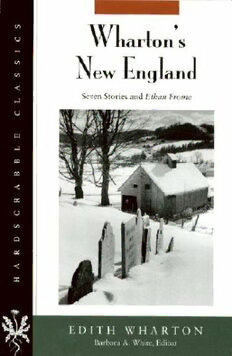
Wharton's New England: seven stories and Ethan Frome PDF
01995·0.509 MB·English
Most books are stored in the elastic cloud where traffic is expensive. For this reason, we have a limit on daily download.
Preview Wharton's New England: seven stories and Ethan Frome
Description:
Although Edith Wharton is usually identified with the "old New York" of such masterworks as The Age of Innocence and The House of Mirth, she spent ten years living and writing in New England, a setting that appears in two novels, a novella, and fully a quarter of her short stories. In these works Wharton turns from portraying the monied and the mannered to probing inscrutable psyches and souls. The New England of these tales-which range from light comedy to horror-becomes a metaphor for fierce poverty, cultural barrenness, and an oppressive Puritan heritage that both fascinated and repelled Wharton.Thus the frigid, engulfing winter of Starkfield buries Ethan Frome in a living death. That sense of moral and emotional confinement also appears in "The Angel at the Grave," as a young woman senses she has been "walled alive into a tomb hung with the effigies of dead ideas." In "The Lamp of Psyche," a visit to Boston relatives sheds new light on a woman's marriage; "Xingu" gently satirizes the snobbery of small-town "huntresses of erudition"; "Bewitched" and "All Souls'" explore the theme of witchcraft. Barbara A. White's insightful introduction suggests that in these stories Wharton "seems to have projected onto New England aspects of herself that she most feared: repression, coldness, inarticulateness, mental starvation, and even lack of high culture."
See more
The list of books you might like
Most books are stored in the elastic cloud where traffic is expensive. For this reason, we have a limit on daily download.
